
Back فوق طبيعي Arabic অতিপ্ৰাকৃতিক Assamese Sobrenatural AST Fövqəltəbiilik Azerbaijani Sobrenatural BCL Звышнатуральнае Byelorussian Звышнатуральнае BE-X-OLD Свръхестественост Bulgarian অতিপ্রাকৃত Bengali/Bangla Sobrenatural Catalan

| Part of a series on |
| Anthropology of religion |
|---|
 |
| Social and cultural anthropology |
| Part of a series on the |
| Paranormal |
|---|
Supernatural refers to phenomena or entities that are beyond the laws of nature.[1] The term is derived from Medieval Latin supernaturalis, from Latin super- (above, beyond, or outside of) + natura (nature).[1] Although the corollary term "nature" has had multiple meanings since the ancient world, the term "supernatural" emerged in the Middle Ages[2] and did not exist in the ancient world.[3]
The supernatural is featured in folklore and religious contexts,[4] but can also feature as an explanation in more secular contexts, as in the cases of superstitions or belief in the paranormal.[5] The term is attributed to non-physical entities, such as angels, demons, gods, and spirits. It also includes claimed abilities embodied in or provided by such beings, including magic, telekinesis, levitation, precognition, and extrasensory perception.
- ^ a b "Definition of SUPERNATURAL". Archived from the original on 2020-02-07. Retrieved 2019-12-11.
- ^ Cite error: The named reference
Bartlettwas invoked but never defined (see the help page). - ^ Cite error: The named reference
Oxfordwas invoked but never defined (see the help page). - ^ Pasulka, Diana; Kripal, Jeffrey (23 November 2014). "Religion and the Paranormal". Oxford University Press blog. Oxford University Press. Archived from the original on 15 February 2015. Retrieved 24 October 2018.
- ^ Halman, Loek (2010). "8. Atheism And Secularity In The Netherlands". In Phil Zuckerman (ed.). Atheism and Secularity Vol.2: Gloabal Expressions. Praeger. ISBN 9780313351839.
"Thus, despite the fact that they claim to be convinced atheists and the majority deny the existence of a personal god, a rather large minority of the Dutch convinced atheists to believe in a supernatural power!" (e.g. telepathy, reincarnation, life after death, and heaven)
© MMXXIII Rich X Search. We shall prevail. All rights reserved. Rich X Search